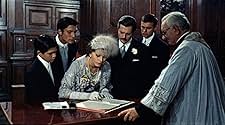NOTE IMDb
7,4/10
12 k
MA NOTE
Un homme riche, Domenico, et Filumena, une prostituée démunie, partagent une grande partie de leur vie dans l'Italie du lendemain de la Seconde Guerre mondiale.Un homme riche, Domenico, et Filumena, une prostituée démunie, partagent une grande partie de leur vie dans l'Italie du lendemain de la Seconde Guerre mondiale.Un homme riche, Domenico, et Filumena, une prostituée démunie, partagent une grande partie de leur vie dans l'Italie du lendemain de la Seconde Guerre mondiale.
- Nommé pour 2 Oscars
- 7 victoires et 10 nominations au total
Marilù Tolo
- Diana
- (as Marilu' Tolo)
Alberto Castaldi
- Doctor
- (as Alberto Gastaldi)
Vincenzo Aita
- Alfonso, Priest
- (non crédité)
Histoire
Le saviez-vous
- AnecdotesDomenico arranges an apartment in Naples for Filumena. The former tenant's belongings are still in. There is a picture of Clara Petacci ( = dictator Mussolini's mistress) on the wall and Filumena asks when is this going to be removed. The scene is set to late 1940's, so this obviously symbolizes Italy's transition from fascism to a republic. Mussolini himself would probably not have passed the censors.
- Citations
Filumena Marturano: [subtitled version] The problem is that our hearts used to be so big...
[holds up pebble]
Filumena Marturano: and now look how small they are.
- ConnexionsEdited into Marcello, una vita dolce (2006)
- Bandes originalesMunasterio 'e Santa Chiara
(uncredited)
Written by Michele Galdieri and Alberto Barberis
Sung by Don Domenico on the trip home from the racecourse; Don Domencio also asks the boys to sing it
Commentaire à la une
The film employs a tremendously perky rhythm and register to showcase the traits of the earthly Italy at its post-war development, even though essentially the overwrought kernel of a prostitute's tribulations could hardly appropriate as a comedy material.
Vittorio De Sica's camera enigmatically haunts and pivots around two leads' present and past, the intangible love/hate chaos is disarmingly intriguing and subconsciously imbues the audience with a fervent compassion towards Sophia Loren's unswerving while passionate Filumena. The leading performance is worth of much accolade, especially for Sophia Loren, whose full-brown force of personality spanning over 20 years in the film and indisputably devotes a magnificent performance with all her zest and vigor. Marcello Mastroianni, is great as well, to hone up his versatility and render the womanizer an ambiguous moral criterion which is a more delicate task.
I cannot help being fascinated by the exquisite script as well, credited by five names, no wonder all the twists and turns are so fruitful in a way that both surprising and amusing. Nominated for 2 Oscars (BEST FOREIGN FILM and a second BEST ACTRESS nomination for Loren) and is a milestone which not only represents Loren's heyday but also is a comforting fruition of Loren-Conti correlation. Maybe it is not director De Sica's best canon due to its slight superficiality of machismo, which I sense may not be the director's fault as it is a general bias lies in all over the globe. Anyway, the film itself surely is a fine piece captures a genuine Italian aura (the Naples' style) and definitely worth your pocket.
Vittorio De Sica's camera enigmatically haunts and pivots around two leads' present and past, the intangible love/hate chaos is disarmingly intriguing and subconsciously imbues the audience with a fervent compassion towards Sophia Loren's unswerving while passionate Filumena. The leading performance is worth of much accolade, especially for Sophia Loren, whose full-brown force of personality spanning over 20 years in the film and indisputably devotes a magnificent performance with all her zest and vigor. Marcello Mastroianni, is great as well, to hone up his versatility and render the womanizer an ambiguous moral criterion which is a more delicate task.
I cannot help being fascinated by the exquisite script as well, credited by five names, no wonder all the twists and turns are so fruitful in a way that both surprising and amusing. Nominated for 2 Oscars (BEST FOREIGN FILM and a second BEST ACTRESS nomination for Loren) and is a milestone which not only represents Loren's heyday but also is a comforting fruition of Loren-Conti correlation. Maybe it is not director De Sica's best canon due to its slight superficiality of machismo, which I sense may not be the director's fault as it is a general bias lies in all over the globe. Anyway, the film itself surely is a fine piece captures a genuine Italian aura (the Naples' style) and definitely worth your pocket.
- lasttimeisaw
- 24 août 2011
- Permalien
Meilleurs choix
Connectez-vous pour évaluer et suivre la liste de favoris afin de recevoir des recommandations personnalisées
- How long is Marriage Italian Style?Alimenté par Alexa
Détails
Box-office
- Montant brut aux États-Unis et au Canada
- 10 600 $US
- Week-end de sortie aux États-Unis et au Canada
- 4 967 $US
- 25 sept. 2011
- Montant brut mondial
- 157 819 $US
- Durée1 heure 42 minutes
- Mixage
- Rapport de forme
- 1.85 : 1
Contribuer à cette page
Suggérer une modification ou ajouter du contenu manquant

Lacune principale
By what name was Mariage à l'italienne (1964) officially released in Canada in French?
Répondre




























